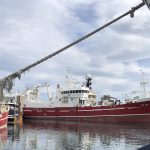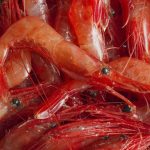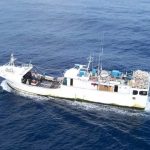Tom and Rob Aikens, Caroline Bennett of Soseki and Moshi Moshi, Geetie Singh of The Duke of Cambridge pub and Peter Weeden of Paternoster Chop House helped launch ‘Good Catch: cooking for change, serving the future’ today at London’s Billingsgate Fish Market.
‘Good Catch’ aims to help chefs and restaurateurs find practical solutions to sourcing sustainable seafood. A great deal of information is currently available to the foodservice industry, but many do not know where to begin. The first tool released through the initiative is the Good Catch Manual – a rough guide to seafood sustainability, designed to help seafood buyers navigate the complexities of responsible seafood procurement.
‘Good Catch’ is a joint venture of the Marine Conservation Society (MCS), Marine Stewardship Council (MSC), Seafood Choices Alliance and Sustain – the Alliance for Better Food and Farming. Half of global fish stocks are fully exploited and a further quarter overexploited. With UK seafood landings declining from 1.2 million tonnes in 1952 to just under 623,000 tonnes in 2006 and seafood consumption rising steadily, chefs and restaurateurs are increasingly recognising the part they can play in the responsible procurement of the seafood they serve.
“The British chef, as much as the consumer, has a huge role to play in bringing back marine life and promoting both clean seas and healthy fish stocks and biodiversity,” said Raymond Blanc of Le Manoir aux Quat’ Saisons. “The Good Catch Manual can help us on this path of responsibility and I am proud to be an active ambassador for this cause.” A recent undercover investigation of the high-end London sushi restaurant Nobu revealed that the restaurant was selling endangered Atlantic bluefin tuna without informing customers. ‘Good Catch’ seeks to provide practical information to seafood buyers up and down the supply chain to help address such sourcing concerns.
The Good Catch Manual takes the most recent recommendations from the Marine Conservation Society’s (updated September 2008) on over 50 species consumed in the UK. These ratings are included along with top tips to ask suppliers, information on the Marine Stewardship Council’s fisheries certification scheme and Chain of Custody programme for restaurants, as well as additional resources and materials for those in the foodservice industries looking to make their businesses more sustainable. Good Catch tools and resources, in addition to the Manual, include:
• www.goodcatch.org.uk – a website which directly routes users to sustainable seafood information and support;
• practical support on sourcing MSC certified seafood and highlighting it on menus;
• Fish Flash – a monthly e-bulletin with sustainable seafood developments and news;
• seafood-themed workshops such as a rough guide to seafood sustainability; engaging front of house staff; communicating a restaurant’s responsible seafood efforts to customers; sourcing, serving and labelling MSC certified seafood;
• visits to fishermen, fish markets and other businesses.
“Sourcing and eating sustainable seafood has never been more important,” said ‘Good Catch’ coordinator Emily Howgate of Seafood Choices Alliance. “Chefs and restaurateurs are in a unique position to influence both the supply chain and consumers when buying and serving seafood, by supporting and offering sustainable options. Good Catch hopes to make it that much easier for them to be able to do this.”








